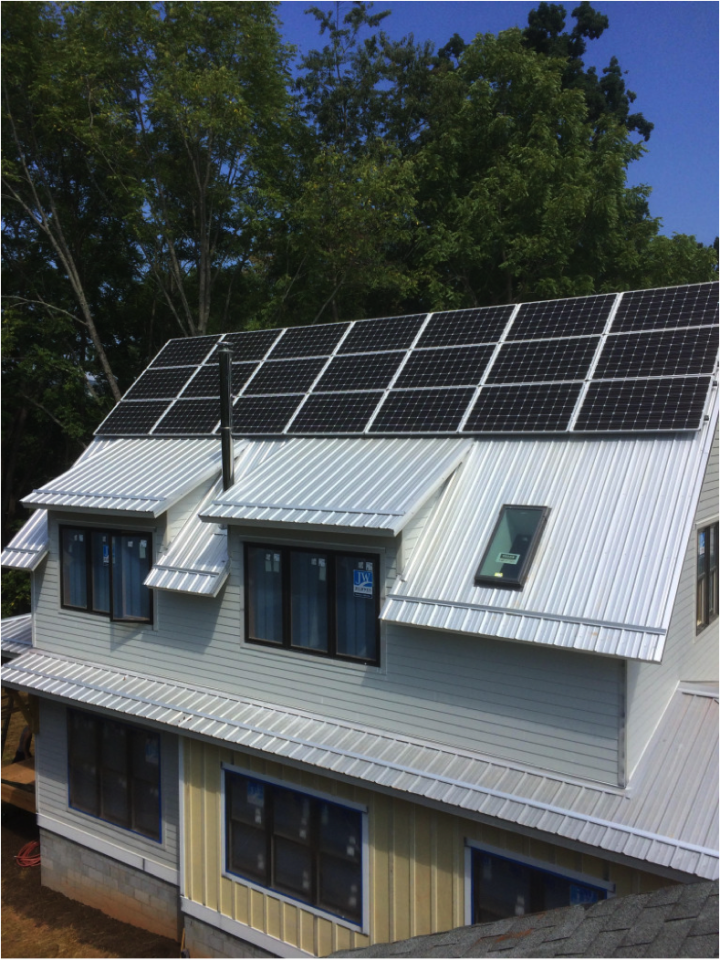Why invest in local energy? That’s like asking why choose a locally grown, organic apple over a Snickers bar. Sure, they’re both sweet and satisfying. But consuming that candy, packed with additives and produced by a giant corporation, has negative long-term health consequences. Buying that apple, on the other hand, carries health benefits and supports our local economy. It also helps make our area more resilient in times of financial disruption.
The same goes for energy choices. Typically, when you flip a light switch, turn up the thermostat or fill your vehicle’s gas tank, you’re choosing energy sources that carry negative consequences for your health, finances and environment. The fossil fuels that supply most of Western North Carolina’s energy are piped, trucked or freighted in from wherever they were mined, drilled, spilled, leaked and/or fracked.
Rather than sending armfuls of hard-earned money to large corporations that operate centralized coal and gas plants, why not keep that money circulating here by choosing local, renewable energy sources? You’d be supporting local businesses and workers while creating less waste.
Starting at home
The cheapest and most accessible energy choices we can make lie in the area of efficiency — in other words, doing more with less. We can turn our thermostats down in winter and up in summer, walk and bike more, and buy more energy-efficient cars and homes. We can also remodel existing structures with efficiency in mind.
The Western North Carolina Green Building Council’s Green Gauge program offers a simple way to evaluate how green a home actually is. It’s a great comparison tool for buyers and sellers alike, or for homeowners needing recommendations for greening their dwelling. Besides energy efficiency, Green Gauge also considers things like water conservation, indoor air quality, landscaping and use of green materials.
If you can afford the initial cost, producing your own energy from renewable sources such as solar, water and waste products is the way to go. Many WNC residents are taking advantage of the tax credits and other incentives to install rooftop photovoltaic panels — meeting their energy needs while enjoying a financial payback.
The North Carolina Legislature has eliminated state tax credits, but the federal government still offers tax credits for installing a solar system, as follows:
- 30 percent for systems placed in service by Dec. 31, 2019.
- 26 percent for systems placed in service after Dec. 31, 2019, and before Jan. 1, 2021.
- 22 percent for systems placed in service after Dec. 31, 2020, and before Jan. 1, 2022.
Microhydro and windmill systems are also being used in WNC. Firewood and biofuel made from used cooking oil, as well as geothermal heat pumps that use the earth’s underground temperature, are other popular energy sources. The ideal is a combination of efficiency and energy production.
Net-zero homes — those that generate renewably all the energy required to operate them — are great examples, and there are growing numbers of them in our region. Ultimately, reducing the demand for electricity reduces both the homeowner’s costs and the drawbacks inherent in using fossil fuels to generate electricity.
The WNC Green Building Council certifies both net-zero-energy and net-zero-ready homes, both of which far surpass even conventional homes with an Energy Star rating, in terms of overall energy efficiency. Net-zero-ready homes are designed to accommodate a future solar installation, with a suitable roof area and a conduit already in place.
The 2015 Asheville Home Builders Association Parade of Homes featured three net-zero-certified homes, built by Earthtone Builders, Mountain Sun Building & Design and JAG & Associates Construction.
Saving for a rainy day
Recent developments in energy storage should make generating renewable energy more feasible for homeowners and businesses alike. The Tesla Powerwall is the most dramatic rollout (and Powerwall2 is expected this summer), though many companies, such as Sonnen, offer options using lithium battery technology.
These products store the power produced when the sun is shining for use when it’s not, or for peak demand times when electricity rates are higher. They can also be used as backups for when the grid goes down. In the past, the most common option was lead acid batteries; they’re still dependable and recyclable, though they take up more room.
Joining a community solar project, in which groups of local people invest in renewable-energy production, is another approach that’s gaining in popularity. The advantages are lower upfront costs, better access to optimal solar sites and availability to people who don’t own homes.
Here in Asheville, members of the First Congregational United Church of Christ pooled their resources to install solar panels on their church. The investors in the company, First Church Solar, own the system and benefit from the tax credits, depreciation and revenue from selling the electricity.
Community solar has the potential to expand both the number of people buying renewable energy and the total amount available, but significant regulatory hurdles remain. Under North Carolina law, electricity can only be purchased from a licensed utility. A bill before the state Legislature, titled The Energy Freedom Act, would introduce limited market competition and give consumers some choice by legalizing third-party sales. At this point, however, it’s merely a good idea.
Taking the show on the road
Local-energy-powered transportation can help make us more resilient during extreme weather events or disruptions to the liquid fuel supply. Blue Ridge Biofuels makes a locally sourced and produced diesel fuel alternative.
One of the cleanest transportation options is the electric, solar-powered car. In North Carolina, we’re fortunate to have the Brightfields Initiative at work. As a result of this U.S. Department of Energy program, solar charging stations have been installed in Asheville, Charlotte and Raleigh.
Meanwhile, electric vehicle technologies and production are changing fast. Until 2015, the Nissan Leaf (the most popular model) got 84 miles per charge. The Chevy Bolt, due out later this year, is projected to get 200 miles on a charge, and a new, more affordable Tesla will match that. The 2016 Chevy Volt gets 53 miles per charge and comes with a backup gas engine that increases the total range to 420 miles. And as more charging stations are installed around the country, electric cars are becoming more user-friendly. There are now about 10 stations in Asheville.
Of course, the most easily accessible transportation energy is human power. Walking and riding a bicycle are as clean and healthy as energy choices get. And if you’re not fit enough to hike or bike, Asheville’s bus system offers another energy-efficient option for in-town travel.
We’re definitely at the beginning of a transformation in how we power our lives. Not all of us have the money or an appropriate location for a perfect renewable-energy system, but whatever your budget, there’s a local-energy “apple” within your reach.
Why not set that Snickers down and grab the apple?
Boone Guyton is a partner in Cady and Guyton Construction, a Green Built NC builder and longtime member of the WNC Green Building Council.




Before you comment
The comments section is here to provide a platform for civil dialogue on the issues we face together as a local community. Xpress is committed to offering this platform for all voices, but when the tone of the discussion gets nasty or strays off topic, we believe many people choose not to participate. Xpress editors are determined to moderate comments to ensure a constructive interchange is maintained. All comments judged not to be in keeping with the spirit of civil discourse will be removed and repeat violators will be banned. See here for our terms of service. Thank you for being part of this effort to promote respectful discussion.